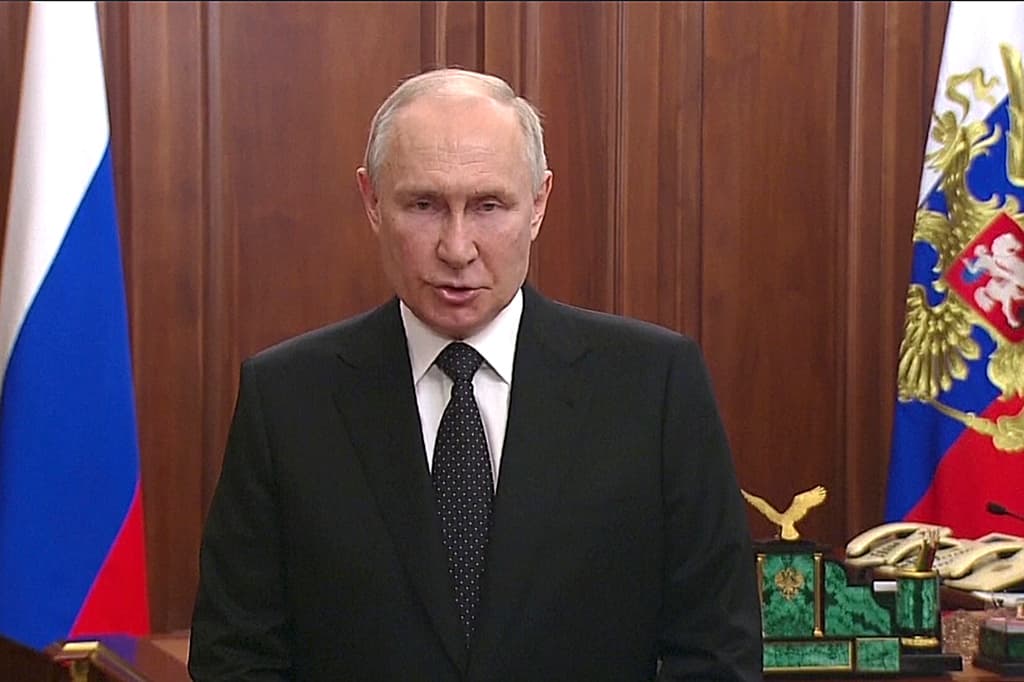Did Putin Flee Moscow During Coup Attempt?
How the Wagner army made its race to Moscow, only to turn around; Yevgeny Prigozhin tries to suggest it was all innocent.

As a two-mile-long convoy of military mutineers neared Moscow Saturday, a Russian presidential plane took off from the capital at 2:15 p.m. local time. It flew in the direction of President Putin’s native St. Petersburg until disappearing from radar at 3:06 p.m., according to Flight Radar.
“Putin is working at the Kremlin,” spokesman Dmitry Peskov said in response to a question from the Russian state news agency, Tass. At the time, grim news was coming up the M4 highway, European Russia’s main north-south motorway.
A Russian air force attack on the mutineers was a fiasco. Soldiers from the Wagner mercenary group shot down six helicopters and one Ilyushin IL-18 airborne command center. The combined shootdowns killed as many as 30 Russian airmen. Debris from one falling helicopter set ablaze the oil depot of Voronezh. Wagner lost five military vehicles, but no soldiers.
“There has not been such a tragedy in the history of our aviation for a long time,” a Russian TV presenter, Vladimir Solovyov, lamented Saturday night. “How many aircraft have we lost today? What is this?”
In Voronezh, the “Wagnerites” took control of local military facilities. There were unconfirmed reports that the 277th Parachute Regiment switched sides. Moving north, the rebel column split in two.
“I ask everyone to get out of our way,” the owner of the Wagner Group, Yevgeny Prigozhin, boomed Friday night in a Telegram message before his convoy sped north. At several spots, his armored personnel carriers plowed through improvised barricades.
Normally, Moscow would have been protected by the 4th Guards Tank Division, a unit set up by Stalin to guard the capital against western invaders. Before President Putin’s attack on Ukraine last year, this unit had about 225 tanks and 300 armored personnel carriers. The 4th Guards, though, suffered 80 percent losses in the Ukraine war, largely in Kharkiv and Luhansk. The British Defense Ministry has estimated it will take years to rebuild the division.
To defend the Moscow region without tanks, local authorities blocked highways with school buses and dump trucks, and started to dig up asphalt with excavators. Bridges over the Oka River were blockaded. Inside Moscow, more blockades were erected and Mayor Sergei Sobyanin imposed a “counter-terrorist regime.” Panic spread among some residents and all air tickets out of Moscow were sold out by Saturday night, Germany’s Der Spiegel reported.
About 125 miles south of Moscow, the column stopped. A deal was brokered by President Lukashenko of Belarus. All charges would be dropped against Mr. Prigozhin, and he would go into exile in Belarus. Of his 25,000 soldiers, those who had not participated in the 24-hour uprising would be allowed to join the Russian Army. With this deal, Mr. Prigozhin brought his convoy back to Rostov-on-the Don and then returned to his military camps in occupied Ukraine.
Two days later, the asphalt is being repaired but the deal looks shaky. Neither Messrs. Prigozhin nor Putin had been seen in public in 48 hours. Russian prosecutors told reporters Monday that they have not had the time to drop charges against the mercenary leader.
Mr. Prigozhin emerged from the shadows Monday with an 11-minute video statement insisting that his group’s actions over the weekend were not a coup attempt, but rather a protest “march” against the “injustice” imposed on his troops by the Russian defense ministry.
In the statement, Mr. Prigozhin taunted the Russian military, calling his march a “master class” that should have been followed during Russia’s ill-fated attempt to capture Kyiv in the early days of the war, and mocking it for allowing his soldiers to proceed unhindered for hundreds of miles through the Russian heartland.
Mr. Prigozhin gave no indication where he is or what his plans are, but said Mr. Lukashenko “proposed finding solutions for the Wagner private military company to continue its work in a lawful jurisdiction.” That suggested Mr. Prigozhin might keep his military force, though it wasn’t immediately clear which jurisdiction he was referring to.
Meanwhile, Russia’s state security services are busy dismantling the Wagner Mercenary Corporation. Recruiting billboards have been torn down and former Wagner soldiers questioned. The modern steel and glass headquarters at St. Petersburg was raided. Agents confiscated the equivalent in rubles of $47 million.
For Mr. Putin, a former KGB colonel, this flurry of activity by his intelligence services may seem too little, too late. In Washington last Wednesday, American intelligence officials briefed administration and military representatives that Mr. Prigozhin was planning to make a military move against senior Russian defense officials, the New York Times reports. Congressional leaders were briefed on Thursday.
In yet another big failure by Russia’s well-funded intelligence services, Mr. Putin seems to have been caught by surprise. The seizure and occupation of Rostov was no minor feat. For a decade, this city of more than a million has served as the major logistical base and military command center for Russia’s military operations in southern Ukraine. Without firing a shot, Wagner rebels took the city Friday night.
Local Russian army units did not block the rebels. Of even greater concern, the Akhmat troops of the Chechen leader, Ramzan Kadyrov, were sent to Rostov. They then stepped aside to avoid confrontation. Civilians welcomed the rebels, posing for selfies with Wagner troops, and in one case placing flowers in the barrel of a tank gun. Well-wishers shouted, “Strength to Wagner.” They jostled for selfies with Mr. Prigozhin as he left Rostov Saturday night.
“It’s like Prigozhin is the person who looked behind the screen at the Wizard of Oz, and saw the great and terrible Oz was just this little frightened man,” the Atlantic Council’s Eurasia director, John Herbst, said Sunday on CNN. “Putin has been diminished for all time by this affair.”

